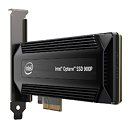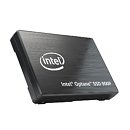Friday, October 27th 2017

Intel Launches its Blazing-Fast Optane SSD 900P SSD
Intel today announced the launch of the Intel Optane SSD 900P Series, the first SSD for desktop PC and workstation users built on Intel Optane technology. Intel, in collaboration with Roberts Space Industries, announced the new SSD at CitizenCon, a Star Citizen community gathering in Frankfurt, Germany.
The Intel Optane SSD 900P Series delivers incredibly low latency and best-in-class random read and write performance at low queue depths - up to four times faster than competitive NAND-based SSDs - opening incredible new possibilities. With the new SSDs, users will unlock more potential from their platform. The Intel Optane SSD 900P Series is ideal for the most demanding storage workloads, including 3D rendering, complex simulations, fast game load times and more. Up to 22 times more endurance than other drives also gives the heaviest users peace of mind."The Intel Optane SSD 900P Series brings the workstation-class performance and industry-leading endurance of Intel Optane technology to a client SSD for the first time, and we know end users will find exciting ways to take advantage of the drive to do great things," said Bill Leszinske, Intel vice president, Non-Volatile Memory Solutions Group, and director of strategic planning, marketing and business development. "We are eager to see the possibilities unlocked by software developers, like Roberts Space Industries with Star Citizen, and the SSD to offer users new ways to use larger data sets and more complex workloads to do more."
During the event, Intel demonstrated the unique universe of Star Citizen on Intel Core i9 processor gaming systems equipped with the Intel Optane SSD 900P Series. The two companies also announced that an exclusive in-game ship, the Sabre Raven, will come with all Intel Optane SSD 900P Series purchases for a limited time.
"The Intel Optane SSD 900P Series is amazingly fast, easily the fastest drive I have ever used," said Chris Roberts, chairman and CEO at Cloud Imperium Games and Roberts Space Industries. "Our Star Engine developers have been working on technology to improve loading times using new techniques developed for Star Citizen and optimized for the Intel Optane SSD 900P Series, which is the fastest SSD we've tested. We continue to enhance Star Citizen so the performance benefits with Intel Optane drives will continue to grow, alongside Star Citizen, into the future."
CitizenCon will be livestreamed from Frankfurt starting at 6:00 a.m. PDT Oct. 27.
The Intel Optane SSD 900P Series is available through local online retail outlets worldwide, starting Oct. 27. For more details on Star Citizen and the Sabre Raven ship, visit Roberts Space Industries. An Intel white paper on evaluating the SSD is available. For more information on the Intel Optane SSD 900P Series and Intel Optane technology, visit Intel's solid state drives page.
The Intel Optane SSD 900P Series delivers incredibly low latency and best-in-class random read and write performance at low queue depths - up to four times faster than competitive NAND-based SSDs - opening incredible new possibilities. With the new SSDs, users will unlock more potential from their platform. The Intel Optane SSD 900P Series is ideal for the most demanding storage workloads, including 3D rendering, complex simulations, fast game load times and more. Up to 22 times more endurance than other drives also gives the heaviest users peace of mind."The Intel Optane SSD 900P Series brings the workstation-class performance and industry-leading endurance of Intel Optane technology to a client SSD for the first time, and we know end users will find exciting ways to take advantage of the drive to do great things," said Bill Leszinske, Intel vice president, Non-Volatile Memory Solutions Group, and director of strategic planning, marketing and business development. "We are eager to see the possibilities unlocked by software developers, like Roberts Space Industries with Star Citizen, and the SSD to offer users new ways to use larger data sets and more complex workloads to do more."
During the event, Intel demonstrated the unique universe of Star Citizen on Intel Core i9 processor gaming systems equipped with the Intel Optane SSD 900P Series. The two companies also announced that an exclusive in-game ship, the Sabre Raven, will come with all Intel Optane SSD 900P Series purchases for a limited time.
"The Intel Optane SSD 900P Series is amazingly fast, easily the fastest drive I have ever used," said Chris Roberts, chairman and CEO at Cloud Imperium Games and Roberts Space Industries. "Our Star Engine developers have been working on technology to improve loading times using new techniques developed for Star Citizen and optimized for the Intel Optane SSD 900P Series, which is the fastest SSD we've tested. We continue to enhance Star Citizen so the performance benefits with Intel Optane drives will continue to grow, alongside Star Citizen, into the future."
CitizenCon will be livestreamed from Frankfurt starting at 6:00 a.m. PDT Oct. 27.
The Intel Optane SSD 900P Series is available through local online retail outlets worldwide, starting Oct. 27. For more details on Star Citizen and the Sabre Raven ship, visit Roberts Space Industries. An Intel white paper on evaluating the SSD is available. For more information on the Intel Optane SSD 900P Series and Intel Optane technology, visit Intel's solid state drives page.



68 Comments on Intel Launches its Blazing-Fast Optane SSD 900P SSD
Also, links to Intel's page return 404.
Edit: Nevermind, it's about $500 for the 480GB drive. With stellar random reads at low queue depths and horrible power draw even at idle.
Im hoping it works on any system. Here's hoping benchmarks soon. The most impressive aspect is that Optane retains most of it's performance even at low queue depths unlike high end NAND SSD-s that require often unrealistic 32 or 64 QD to reach advertised speeds (that's why 960 PRO is hardly faster in day to day use compared to 850 PRO SATA SSD).
I think these will be out of stock soon, since it's been a couple of years waiting.
I think they mean PCI-E x4
Odd that PCI-E and 2,5" form factor have the same price. 2,5" should be cheaper.
I'm hoping new M.2 versions come out also that are x4 instead of x2! Then do this:
I could have missed something though.
1st they limited it to Z270. Well this i can sort of understand regarding RST and caching.
2nd they limited to caching only SATA drives.
3rd they limited it to caching only primary OS drive and not data drives.
Optane 900P should by the looks of it avoid all those problems. Granted it's not a cache but still. Also for me 280GB is enogh for OS and apps (i have games, data and video on all separate SSD-s with video on HDD due to size requirements). Currently using Samsung 850 PRO 128GB and there's constantly about ~60GB free on it (119GB usable after NTFS formatting).
Yea yea I know I can find the specs elsewhere, but geez, at least give us something to think about before we start thinking about it...
It's taken long for even Intel to come out with products themselves.. but I would have thought Micron would be here too.
sooo money o_O
What are the prices of these? Someone said
500*(599 according to review)? If so thats so money.www.pcper.com/reviews/Storage/Intel-Optane-SSD-900P-480GB-and-280GB-NVMe-HHHL-SSD-Review-Lots-3D-XPoint/Performa-2
mixed work load is awesome :D
This is cheaper than I was expecting which is awesome. I think i'll wait for a 1TB model and a new controller because that controller is holding back the drive :/
Samsung will have to respond fast with their Z-NAND solution and I'll be eager to see how it compares.
You don't see it much because most other SSD manufacturers make M.2 drives instead to save money, M.2 is the successor to mSATA and was originally designed for laptop use (hence some overheating issues without additional cooling).